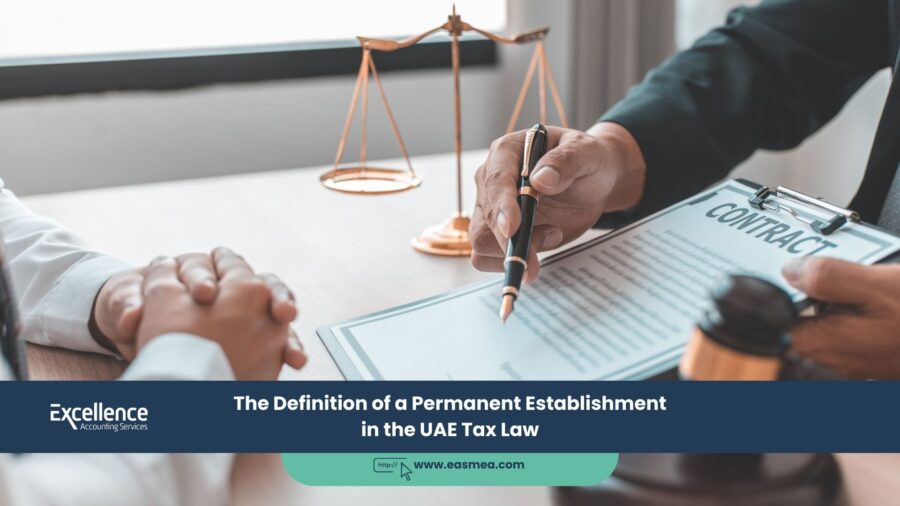A Guide to the Definition of a Permanent Establishment in the UAE Tax Law
For any foreign company doing business in or with the UAE, the introduction of Corporate Tax has created a new and critical question: “Do our activities in the UAE make us liable for tax here?” The answer to this question hinges on a crucial legal concept known as a **Permanent Establishment (PE)**. It is one of the most important definitions in the entire Corporate Tax Law, as it determines the threshold at which a non-resident company creates a taxable presence in the country.
- A Guide to the Definition of a Permanent Establishment in the UAE Tax Law
- The Core Concept: Why Permanent Establishment Matters
- Type 1: The Fixed Place of Business PE
- Type 2: The Dependent Agent PE
- What is NOT a Permanent Establishment: The Exemptions
- PE Risk Assessment and Advisory with Excellence Accounting Services (EAS)
- Frequently Asked Questions (FAQs)
- Do You Have a Taxable Presence in the UAE?
Understanding whether your business has a PE in the UAE is not an academic exercise; it is a fundamental compliance and risk management issue. Accidentally creating a PE without realizing it can lead to significant unforeseen tax liabilities, penalties, and administrative burdens. The definition is nuanced and goes far beyond simply having a registered branch or office.
This guide provides a detailed breakdown of the definition of a Permanent Establishment under the UAE Corporate Tax Law. We will explore the two main types of PE—the “Fixed Place” PE and the “Dependent Agent” PE—and clarify the activities that are specifically exempt, helping you assess your company’s potential tax exposure in the UAE.
Key Takeaways
- PE Creates a Taxable Presence: If a non-resident company has a Permanent Establishment in the UAE, it becomes subject to the 9% Corporate Tax on the profits attributable to that PE.
- Two Main Types of PE: A PE can be created through a **Fixed Place of Business** (like an office or factory) or through a **Dependent Agent** who acts on the company’s behalf.
- It’s About Substance, Not Just Form: The PE rules look at the actual substance of your activities in the UAE, not just your legal structure. For example, the presence of key decision-makers can create a PE even without a formal office.
- Preparatory Activities are Exempt: Certain activities of a “preparatory or auxiliary” nature, such as storing goods or collecting information, do not create a PE.
- Expert Assessment is Crucial: Determining whether your activities create a PE requires a careful analysis of the facts and the law. Professional guidance from tax experts is highly recommended.
The Core Concept: Why Permanent Establishment Matters
The concept of a PE is an internationally recognized standard, primarily based on the OECD Model Tax Convention. Its purpose is to determine which country has the right to tax a company’s profits. In simple terms, a foreign company’s business profits are generally only taxable in its home country, *unless* it has a significant and continuous presence in another country that rises to the level of a PE. If a PE exists, the host country (in this case, the UAE) gains the right to tax the profits generated by that PE.
A Permanent Establishment is the line in the sand. On one side, your profits are not subject to UAE Corporate Tax. On the other side, they are. Knowing where that line is is critical.
Type 1: The Fixed Place of Business PE
This is the more intuitive type of PE. A non-resident company has a Fixed Place PE if it has a fixed or permanent place in the UAE through which its business is wholly or partly conducted. The key conditions are:
- A Place of Business: There must be a physical location, such as premises or, in some cases, machinery or equipment.
- Fixed: The place must have a degree of permanence and be located in a specific geographical spot.
- At the Disposal of the Company: The company must have a certain degree of control over the place.
- Business Conducted Through the Place: The company’s core business activities must be carried out through this location.
Examples of a Fixed Place PE include:
- A place of management or a head office.
- A branch, office, factory, or workshop.
- A mine, oil or gas well, or any other place of extraction of natural resources.
- A building site or construction project that lasts for more than 6 months.
Type 2: The Dependent Agent PE
This is a more nuanced and often overlooked way to create a PE. A foreign company can have a taxable presence in the UAE even without a fixed office if it has a person (an individual or a company) acting on its behalf in a certain capacity.
A Dependent Agent PE is created if a person acting in the UAE on behalf of the non-resident company **habitually** does one of the following:
- Concludes contracts in the name of the non-resident company.
- Negotiates contracts that are concluded by the non-resident without material modification.
The key here is the concept of a **Dependent Agent**. This is contrasted with an **Independent Agent** (like a broker or general commission agent) who acts in the ordinary course of their own business. An independent agent generally does not create a PE for their foreign principals.
What is NOT a Permanent Establishment: The Exemptions
The law specifically exempts certain activities from creating a PE, even if they are carried out through a fixed place of business. These are activities that are considered to be of a **”preparatory or auxiliary”** nature. The list includes:
- Using facilities solely for the purpose of storing, displaying, or delivering goods.
- Maintaining a stock of goods solely for the purpose of processing by another person.
- Maintaining a fixed place of business solely for purchasing goods or collecting information.
- Conducting any other activity that is of a preparatory or auxiliary character.
Important Note (Anti-Fragmentation Rule): You cannot avoid creating a PE by “fragmenting” your operations across different locations or related parties if the overall combined activity is not preparatory or auxiliary.
PE Risk Assessment and Advisory with Excellence Accounting Services (EAS)
Determining your PE status is a high-stakes assessment that requires a deep understanding of the law and a thorough analysis of your specific business activities. EAS provides expert guidance to help non-resident companies navigate this complexity.
- PE Risk Assessment: We conduct a detailed review of your UAE operations, contracts, and agency relationships to provide a clear opinion on whether you have a PE in the UAE.
- Strategic Tax Structuring: As part of our business consultancy, we advise on how to structure your UAE presence and activities to be tax-efficient while meeting your commercial objectives.
- Corporate Tax Registration and Compliance: If it is determined that you have a PE, we can manage your Corporate Tax registration, calculate the profit attributable to the PE, and handle all your tax filing obligations.
- Double Taxation Treaty Advice: We analyze the relevant Double Taxation Treaty between the UAE and your home country, which can often modify the standard definition of a PE.
Frequently Asked Questions (FAQs)
If you have a PE in the UAE, you are considered a “Taxable Person.” You will be required to register for Corporate Tax, maintain audited financial statements for your PE, calculate the profit attributable to it, and file a Corporate Tax return, paying 9% tax on the taxable profit exceeding AED 375,000.
It is possible. If a home office is used on a continuous basis for carrying out the core business activities of the foreign employer, and the employer has a degree of control over it, it could be considered a “fixed place of business.” This is a complex area that depends heavily on the specific facts and circumstances.
The DTT between the UAE and your home country is very important. The definition of a PE in a DTT may be narrower than in the UAE domestic law. In such cases, the treaty definition will generally override the domestic law, potentially preventing a PE from being created. For example, a treaty might extend the construction site period from 6 months to 12 months.
No. A subsidiary is a separate legal entity. It is not automatically a PE of its parent. However, a PE could be created if the subsidiary acts as a dependent agent for its parent (e.g., by habitually concluding contracts on the parent’s behalf) or if the parent company has a fixed place of business at its disposal on the subsidiary’s premises.
There is no precise definition in the law, but it implies a pattern of regular and continuous activity. It is not about the number of contracts but the regularity of the authority being exercised. An isolated, one-off transaction would not be considered habitual.
If the representative’s activities are limited to promotion, advertising, and collecting information (preparatory and auxiliary activities), and they do not have the authority to negotiate or conclude contracts, this would generally not create a Dependent Agent PE.
The PE must be treated as a separate and independent entity. The profit is calculated based on the “arm’s length principle,” meaning you must attribute the profits that the PE would have earned if it were an independent company performing the same functions and bearing the same risks.
The same principles apply. A Free Zone subsidiary is a separate legal entity. It does not automatically create a PE. However, if the Free Zone company acts as a dependent agent for its foreign parent, a PE could be established.
These are two different concepts for two different taxes. The threshold for creating a VAT establishment can be lower than that for creating a Corporate Tax PE. It is possible to be registered for VAT without having a PE for Corporate Tax purposes.
You should seek professional tax advice immediately. A qualified advisor can conduct a thorough review of your operations and provide a formal opinion. If a PE exists, they can guide you through the process of registration and compliance to mitigate any potential penalties for late registration.
Conclusion: A Critical Assessment for Cross-Border Business
The concept of a Permanent Establishment is the gateway to Corporate Tax liability for non-resident companies in the UAE. It is a nuanced and fact-dependent area of the law that requires careful and proactive assessment. For any foreign business with connections to the UAE—whether through personnel, agents, or physical locations—understanding your PE risk is not just a compliance task; it is a fundamental part of your strategic entry and risk management in this dynamic market.
Do You Have a Taxable Presence in the UAE?
Contact Excellence Accounting Services for a confidential consultation on your company's activities in the UAE.




